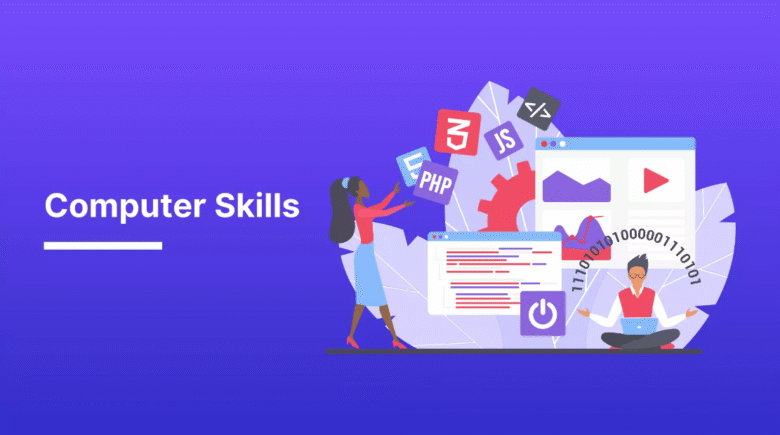In the digital age, computers are a necessity, not a replacement. Whether you’re studying, managing accounts, applying for jobs, or simply staying connected, computer literacy is an essential skill. In the 21st century, our employment, education, and communication are based on basic computer skills. Computer literacy not only increases your productivity at work but also builds confidence and independence in your personal and professional life. The beneficial news is that you don’t have to be a techie to learn these skills. Anyone can master the basics and, with time and regular practice, become digitally literate. Let’s explore the essential computer skills everyone needs to stay relevant in this technologically advanced society.
1. File Management and Operating System:
Every computer runs on an operating system (such as Windows, macOS, or Linux). The first step to digital literacy is learning how to use it. You need to be able to manage storage space effectively, organize data, and navigate folders. While creating, renaming, copying, and deleting files may seem simple, mastering these tasks helps you maintain a tidy digital workspace. Knowing how to install and uninstall programs, manage system updates, and troubleshoot simple problems can save time and money. Furthermore, with the increasing popularity of cloud computing, learning to use services like Dropbox or Google Drive to store and retrieve data can offer flexibility and convenience. Besides boosting productivity, effective file management ensures that your critical information is secure and readily accessible when needed.
2. Document Creation and Word Processing:
Word processing is one of the most essential computer skills today. Offices and schools use programs like Google Docs and Microsoft Word. Writing reports, resumes, essays, and letters requires the ability to write, format, and edit. To make your work look professional, you need to be able to use tools like style formatting, paragraph alignment, and spell check. Knowing how to add images, tables, and hyperlinks makes your documents more attractive and engaging. Knowledge of file formats such as .docx, .pdf, and .txt also ensures compatibility when sharing or publishing your work online. Cloud-based solutions like Google Docs offer real-time editing and sharing features, making remote work and teamwork easier and more efficient.
3. Data Management and Spreadsheets:
Spreadsheet skills are essential for organizing and interpreting data, and their uses extend far beyond just numbers. Google Sheets and Microsoft Excel are essential tools for managing projects, controlling expenses, and evaluating sales data. You should be able to create charts or graphs for visualizations, enter data, and apply simple formulas (such as SUM or AVERAGE). Knowledge of creating pivot tables, applying conditional formatting, and filtering data will help you derive valuable insights from large data sets.
Spreadsheets are not just for accountants or data analysts; anyone can use them to plan tasks, manage budgets, and track goals. Employers across all industries value spreadsheet skills because they demonstrate analytical thinking and attention to detail. Even basic knowledge can develop over time into a powerful skill that increases your value in the workplace.
4. Email Communication and Internet Navigation:
One of the most practical and important computer skills is how to use the internet effectively. While the internet is rich in information, not everything is equally reliable. You can maximize your internet use by learning how to search effectively using keywords, evaluate reliable sources, and bookmark important websites. You should also be familiar with basic browser functions, such as tab management, clearing history, and using extensions and plugins safely.
Learning to communicate via email is equally important, as it remains the most popular form of professional communication. Writing clear and concise emails, attaching files, and correctly using carbon copies (CCs) or blind carbon copies (BCCs) all demonstrate professionalism. Maintaining effective online security requires you to organize your email, filter spam, and recognize phishing attacks. Mastering these email and internet skills will make you more efficient, better connected, and more knowledgeable in every aspect of your digital life.
5. Data Protection and Cybersecurity:
With online fraud and data breaches becoming increasingly common, cybersecurity awareness is crucial. You must understand how to protect your professional and personal data from threats. Start by regularly updating your software, using two-factor authentication, and setting secure passwords. Important practices include recognizing phishing emails, avoiding suspicious links, and understanding the importance of antivirus software. To prevent data loss, it’s also a beneficial idea to regularly back up your data (in the cloud or on external devices). Privacy settings on social media and apps can help limit who can access your personal information. Cybersecurity isn’t just about technical security; it’s about regularly practicing safe online practices. Understanding potential risks can help you avoid them and protect your online presence.
Conclusion:
Learning computer basics is a necessity for success in modern society, not a luxury. These skills form the foundation of all digital activities, both at work and in your spare time. Every skill you acquire—whether it’s file management, document creation, data analysis, online communication, or cyber threat prevention—can significantly enhance your personal and professional development. Moreover, you can learn these skills at any age and at a low cost, thanks to the abundance of free online tutorials and courses. Staying abreast of the latest technological developments will keep you competitive and flexible. Computers are tools that make life easier; the more you know about them, the more confident you’ll be in the digital world.
FAQs:
1. Why are basic computer skills essential today?
Almost every aspect of work, education, and daily life relies on computers for efficiency and success.
2. How can a beginner start learning computer skills?
Beginners can start by participating in community computer skills events, watching YouTube videos, or following free online tutorials.
3. Which computer programs are most important?
The most commonly used applications are Microsoft Word, Excel, PowerPoint, and web browsers like Chrome or Edge.
4. How can I use my computer and stay safe online?
Use relevant antivirus software, set strong passwords, avoid suspicious links, and keep your software up to date.
5. Will computer skills benefit my career?
Of course! Employers value computer-savvy candidates because they demonstrate flexibility, efficiency, and readiness for the modern workplace.




